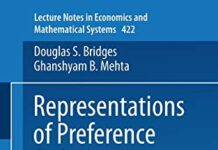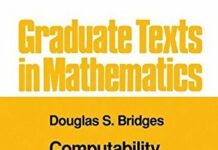
Ebook Info
- Published: 1998
- Number of pages: 336 pages
- Format: PDF
- File Size: 5.42 MB
- Authors: Douglas S. Bridges
Description
A complete course on metric, normed, and Hilbert spaces, including many results and exercises seldom found in texts on analysis at this level. The author covers an unusually wide range of material in a clear and concise format, including elementary real analysis, Lebesgue integration on R, and an introduction to functional analysis. The book begins with a fast-paced course on real analysis, followed by an introduction to the Lebesgue integral. This provides a reference for later chapters as well as a preparation for students with only the typical sequence of undergraduate calculus courses as prerequisites. Other features include a chapter introducing functional analysis, the Hahn-Banach theorem and duality, separation theorems, the Baire Category Theorem, the Open Mapping Theorem and their consequences, and unusual applications. Of special interest are the 750 exercises, many with guidelines for their solutions, applications and extensions of the main propositions and theorems, pointers to new branches of the subject, and difficult challenges for the very best students.
User’s Reviews
Reviews from Amazon users which were colected at the time this book was published on the website:
⭐The book was like new. Just what I wanted.
⭐The perfect book for a budding mathematician. Many books on mathematics focus on solving problems; this sets students up for failure in higher mathematics. Analysis should be understood through exploration and practice. This book challenges any student. The logic and content flow in unison. Great read for those interested in Analysis with a modern approach. A high level of input is required to understand all of the books content.
⭐While at times the logic of this book is very clear, I would not say this is a good book. I would not recommend it for self study, and I think it would be a terrible choice of a textbook at any level. It might be useful for someone who already knows the material and wants a concise review of it, but I do not think it would make a useful reference either. The philosophy of the author is downright offensive.The author writes with an inflated view of his own areas of expertise; in addition to including a few explicit rants about the lack of students’ background and interest in real and functional analysis, this attitude shows through in his presentation of much of the material without motivation or discussion. There is next to no mention of any of the rich connections of the subjects covered to other branches of mathematics. The author holds the annoying (and I believe very wrong) notion that mathematical analysis is a field of study in which intuition is inherently flawed and should be made subordinate to logic. Instead of helping the reader develop proper intuition, the book focuses exclusively on logic. The book follows a dry theorem-proof based approach, is almost completely linear, and the proofs emphasize concise logical presentation at the expense of understanding the motivation for and underlying meaning of the results.The one-chapter review of basic analysis is not very useful–any student already knowing the material will not need it, but those learning it for the first time would find it difficult, uninteresting, and non-comprehensive.However, I also find later chapters disappointing. Measure theory is introduced slightly differently from many books, but there is no discussion of why the particular path was chosen. Many of the usual proofs that have a clear intuitive interpretation are presented without that interpretation–the reader is left with the ability to follow or memorize the proofs, but without the ability to understand them or construct them on her own. Later chapters are made to depend on earlier ones in a most rigid fashion, making this book difficult to use as a reference. The book presents one particular view of the material without preparing the reader for encountering other perspectives.In short, there is nothing fresh and new that this book has to offer, and it is deficient in many ways. If you are a crotchety old man who likes to rant about the low quality of mathematics students these days, you might just like this book. Otherwise, just pick up one of the many excellent analysis texts out there. Rudin’s has much more motivation (and imagination!) and focuses more on intuition than this text, and it somehow does this while covering more material. Royden’s book is the classic–it has much more explanation and is very easy to read. One might also look at one of the texts that emphasise applications of measure theory to probability, or one of the many texts that develops measure theory in the context of functional analysis.
Keywords
Free Download Foundations of Real and Abstract Analysis (Graduate Texts in Mathematics, 174) 1998th Edition in PDF format
Foundations of Real and Abstract Analysis (Graduate Texts in Mathematics, 174) 1998th Edition PDF Free Download
Download Foundations of Real and Abstract Analysis (Graduate Texts in Mathematics, 174) 1998th Edition 1998 PDF Free
Foundations of Real and Abstract Analysis (Graduate Texts in Mathematics, 174) 1998th Edition 1998 PDF Free Download
Download Foundations of Real and Abstract Analysis (Graduate Texts in Mathematics, 174) 1998th Edition PDF
Free Download Ebook Foundations of Real and Abstract Analysis (Graduate Texts in Mathematics, 174) 1998th Edition


